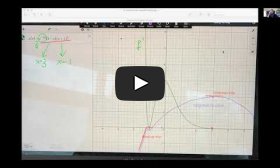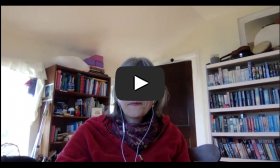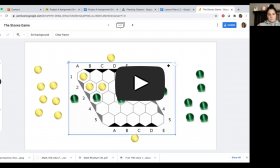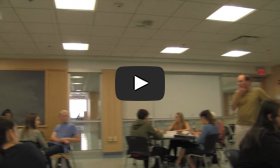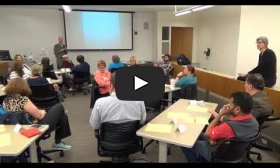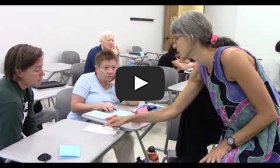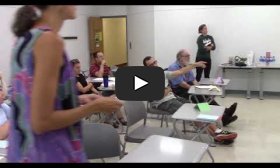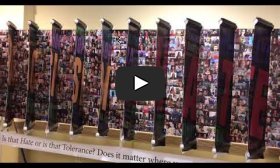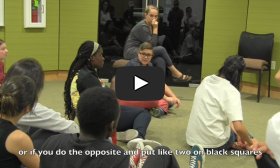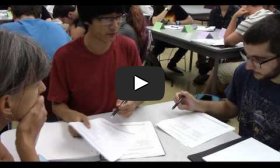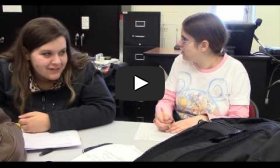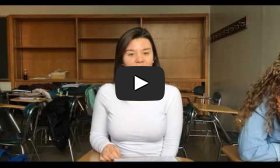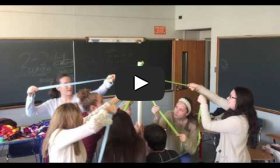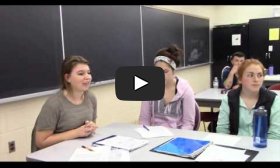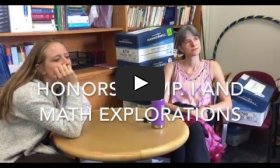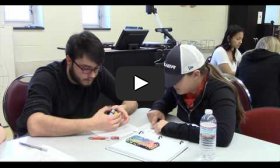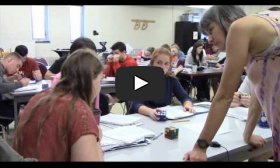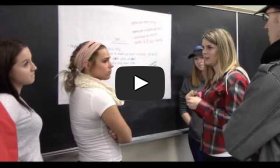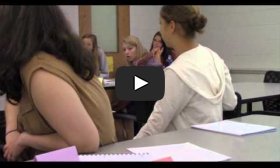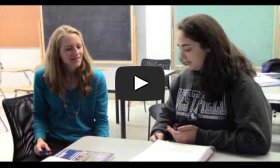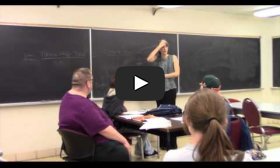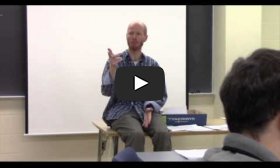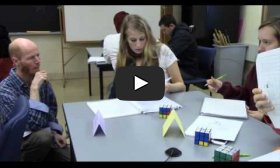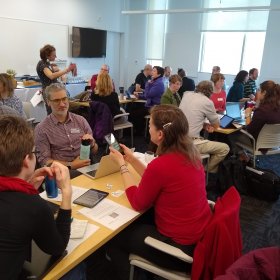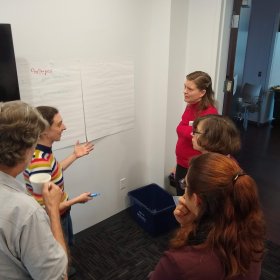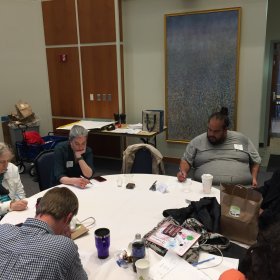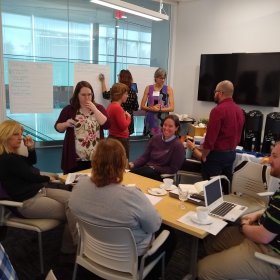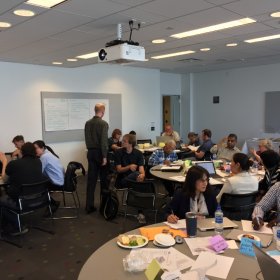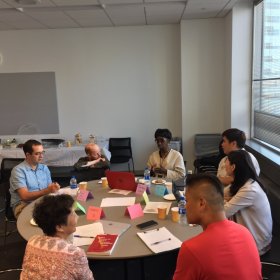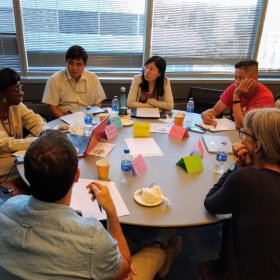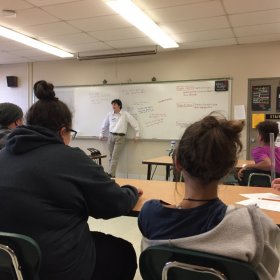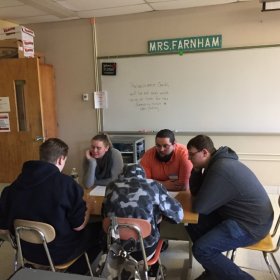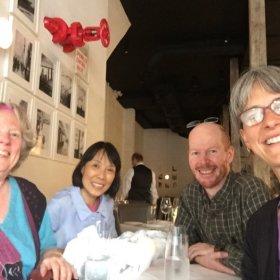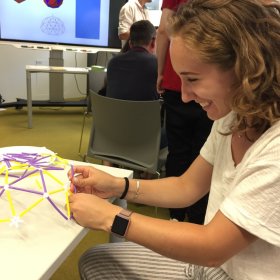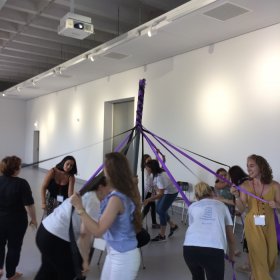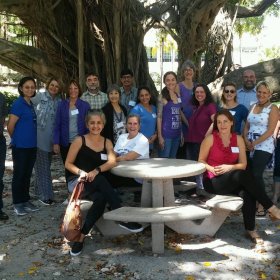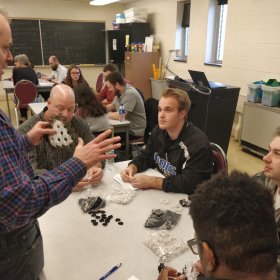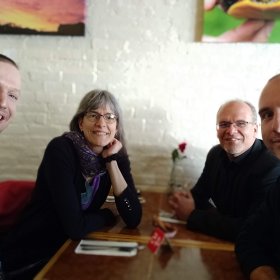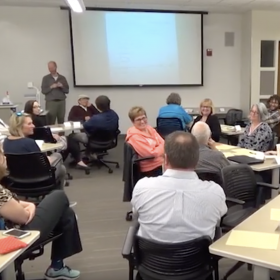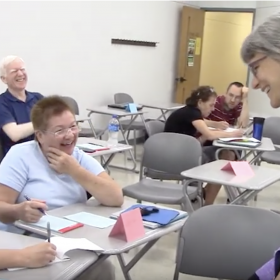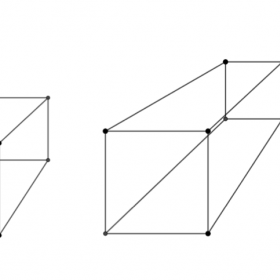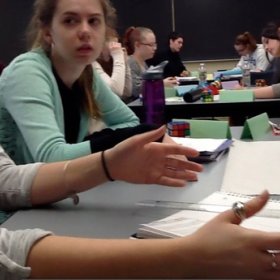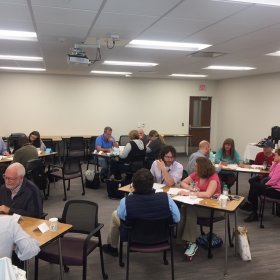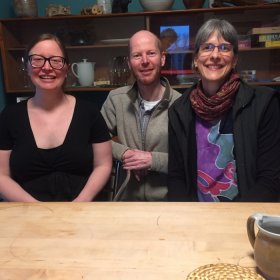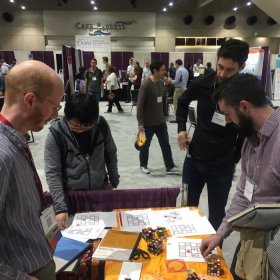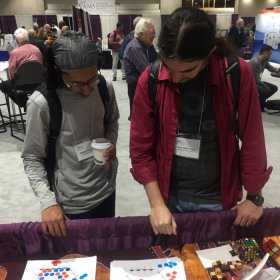The images and videos in the Art of Mathematics media library showcase the active student involvement in our classrooms and the decentralized role of the instructor. You can browse the most recent images and videos shown below or search for specific examples of student activities, e.g. search for "Pick's Theorem" in videos to watch a small group of students investigating the areas of polygons on a geoboard.
Media Library
Multiple search terms will be joined with AND by default. You can also enter OR to widen your search, e.g. searching for maypole OR salsa will return all results containing either maypole or salsa. To reset or clear the search, delete all terms and click update again.
Pages
Multiple search terms will be joined with AND by default. You can also enter OR to widen your search, e.g. searching for maypole OR salsa will return all results containing either maypole or salsa. To reset or clear the search, delete all terms and click update again.
Pages
Perhaps the best way to understand the depth and powerful impact of our project is to read what the students have to say about their experiences. The following student quotes, collected during the project, are typical responses received as part of student journals, essays and reflections.
Multiple search terms will be joined with AND by default. You can also enter OR to widen your search, e.g. searching for maypole OR salsa will return all results containing either maypole or salsa. To reset or clear the search, delete all terms and click search again.
Before this class, I never thought of myself as much of a mathematician.I hated math, I thought I was bad at it, and I was dreading taking this class. This class showed me that not all math is formulas and numbers. I found myself engaged in each activity and actually enjoying them. I was making mistakes and sharing them, which in turn helped my classmates and I come up with a solution.I felt more comfortable sharing my mistakes because it is crucial to my learning process.This class helped me realize that I do not need to be good at traditional mathematics in order to be a good mathematician.
In class we had the chance to read some children’s books that were about mathematicians or scientists. Taking this class and reading these books have made me realize what it is actually like to think like a mathematician. To think or act like a mathematician you have to realize that it will not always be pretty. Your work will get messy. Messy is OKAY! I feel the reason why I had a fear for math before is because I was under the impression that math had to be perfect. I’ve come to find out that that is so wrong! One thing that Professor Von Renesse said in the beginning of the semester was “All kids see is the perfectly organized text book. They don’t see the stack of messy papers on the mathematicians’ desk(s) that figured out the math to then write the book.” That has been something that I have truly said over and over again in my head all semester because my work has NOT been pretty.
To recognize me as a mathematician feels good. Before I couldn't care less about math. It was always a subject I had dreaded taking, but after this semester I learned more about why things worked and I think that's why I am happy to call myself a mathematician. I like to know why things work and I like to find the right explanation.
I think that I have developed as a math mathematician during this semester because of the confidence I have gained. Being able to accept my mistakes in this class and build from them has been the best thing for me and math. In the past, I have never been strong at math. I had always given up when it came to hard problems because I knew I was going to get it wrong anyways, so why put in effort. But from this class being wrong was accepted and gave us a way to continue learning from our mistakes. I felt a lot more confident in myself after I had corrected my mistake and gotten it right.
I think that me experiencing mathematics in this new “light” as the different areas that I have had to think about has caused me to be more curious about how math itself works and why we are always just taught formulas and equations rather than how math works and how math has evolved. I think the fact that this class is so different than any other math classes is really interesting to me, so being able to think about the reasoning of all of this stuff is really cool. I enjoy to be able to look at the different aspects of why this stuff works.
When we went over the syllabus at the beginning of the semester, I was very nervous at the fact that we had to share a mistake in front of the class. I was fearful that I would be judged based on my mistake, which is why it took me so long to share. As time went on and as my peers shared their mistakes, I realized that they probably shared the same fear that I had and that it wasn’t as bad as I was making it out to be. I now believe that sharing our mistakes built a better classroom community around us. We showed each other that it is okay to make mistakes and that we can learn valuable lessons from them. I hope to carry this philosophy with me to my future endeavors.
I used to bask in my successes and look down on others when they failed. This class has helped me to see that others failures can be used to fuel my successes so that I can prevent failures in the future. When I fail I no longer am ashamed to ask for help, I am ready to ask my group mates for help, who are eager to help rather than ridicule. This has helped me to change my demeanor about failures in general. Everyone experiences failures, but only the smartest people will ask for help so that they can keep moving forward and not be held back by their failures. This has helped me and will continue to help me in all my future classes, as well as in my career because it will allow me to feel more comfortable asking for help so that I can produce quality work, rather than pretend to not need help, then produce subpar work. These lessons will help me to become more successful in life and ultimately happier knowing that I have no problem asking for help from others.
I developed a lot this semester as a mathematician. This year I was the most successful I had ever been in a mathematics class. It was largely due to how interactive the class was. I have never been in such a collaborative class before. I have never learned well with the traditional lecture approach, so Calculus II really highlighted how I can most effectively learn. In addition to this, I also learned how much writing about your work can help you learn and understand the material. All of the stories forced me to understand what I was doing. When you are forced to put your ideas down as words, it somehow makes everything else click. I truly believe that if we didn’t have these stories each week, I would not have done nearly as well in the class. Finally, I believe in my ability to take classes that I am intimidated of. I thought for sure I would fail this class since I barely passed Calculus I. Calculus II proved to me that I can do well in a class that I have doubts in. I hope that all of my classes in the future have the same type of interactive style, as well as require me to write, because if this is the case, I know I can succeed.
Overall I really enjoyed this course and I’ve learned more than I ever could have anticipated. This course has allowed me to really think outside of the box and really push myself to look at different strategies and methods and come up with a solution! Sometimes I would feel a little bit discouraged when I would hear other classmates talking about their strategies and methods because I would be completely lost within their explanation, but in the end it has only helped me to really think about math in ways I’ve never imagined and to grow as a mathematician!
This course has made me appreciate mathematics more and taught me many valuable skills like being able to truly understand the concept and thoroughly explain my thought process, cooperating and communicating with others to solve and learn new concepts together and thinking outside of the box to find other methods to solve the problem instead of being close minded.
This course has made me think differently about mathematics. I have definitely developed as a mathematician. Before this class, I believed there was only one way to find a solution to any problem. I would never look deep into things and make sense of different ways to solve problems. I now realize that spending a lot of time on problems is worth it because you may notice other ways to get a solution. Also, this course has shown me that you have to understand how others learn and you have to think outside the box at times. When I become a teacher, I am going to have to understand how my students are thinking and be able to explain things in different ways for different students.
As a mathematician, I have developed in ways I couldn’t have imagined throughout this semester. I used to think that math was either a success of fail when it came to solving problems. After taking this course, I realized that’s not the case. If you don’t quite get the concept, it’s not a fail, it’s an almost, and you can keep revising until you get it right.
I have truly improved ... immensely in this course. Being forced to take an independent approach on my problems in this course, I found a sense of confidence. I can rely on myself to find the answer now instead of coming to the problem feeling completely unready to attempt to solve it. This course has also greatly improved my problem-solving skills. This is something that I need to have in my back pocket not only for my other courses but my career.
I have become much more willing to start over and go back to look again. I do not think you realize how big that is. I never used to do that! Ever! If the answer was not there after I looked at the whole problem the first time, I would sit back and wait for someone else to come along and point out what the answer is and most of the time I would not even bother going back in and fixing my mistake or seeing where I went wrong. Never would I question the other answers. But that is what this class has taught me and that is what I will take away. Question everything. Keep looking. Never give up. Look in between the lines. See if you can make a connection from where you started to where you are now. Are they related? This class has changed my outlook on life and my drive for not just math, but for school. At one point, I was not even sure I wanted to go to college, just that I had to so people would not think down on me and that I had time to still figure out my future. This class has taught me much more than I have ever been taught in any other class throughout my life. What’s more is this class ... helped me rediscover the ambition I once held for math, allowed me to believe in myself.
After watching the video [Proof] in class, I learned to never give up on a problem. Andrew Wiles worked on proving Fermat’s Last Theorem for about seven years and knew to not give up as he was getting closer to the solution over time. In class, I might be overwhelmed with some problems and sometimes feel like giving up. Now seeing someone put in so much time and effort into one problem, it made it seem less stressful as I can put more effort into the classroom to go further in my learning of mathematics. Also, from the video I learn that it’s okay to seek help from others as it will only benefit me in the long run. Although I might be discouraged at first, I know that if I start asking questions to other peers I might learn new things or ways of thinking in mathematics. In mathematics, there’s no defined way of looking at problems as I learned in this class as we approach problems in new ways that will expand my ways of thinking in the world.
In relation to the video that was shown in class called Proof, Andrew Wiles goes through a series of steps and learning experiences like groups in this class do, before coming to a conclusion on a proof. This involves perseverance, critical thinking, and elaboration along with colleagues or team members. Sometimes, after putting much thought and work into a problem, you realize that somewhere, a piece of information is missing, or something isn’t entirely correct. It is important to keep trying instead of giving up. Sometimes this may take awhile, and require you to walk away and come back to the problem later on (both things that Andrew Wiles does, however over many years), but it is important to keep striving. Mistakes should not be feared. Sometimes, you also need to take time into looking at methods you wouldn’t normally. You can be blind sighted by what is already known to you or what you are currently comfortable with, however, different paths and ways of seeing a problem exist and you have to utilize all sources in order to get somewhere. These are all lessons I have learned throughout this semester, and that I had noticed within the reading and video.
Through the write-ups we have done in class, reading A Mathematicians Lament, watching films in and outside of class and discussing them with each other, I have learned that the key to mathematics is how you choose to look at the problem you are given … the real “art of Mathematics” is explanation… This is [an] important lesson that I have taken away from this course. While it feels good to come up with the correct answer, that answer is not worth anything if you cannot explain to others why it is correct and how you know it is [correct]. … the real accomplishment is being able to prove your answer through your own work, which is what this course has taught, and allowed, me to do.
A quote by Paul Lockhart that really stood out to me was “Math is not about a collection of “truths” (however useful or interesting they might be). Math is about reason and understanding. We want to know why. And not for any practical purpose.” (p.110). I was always taught that math was about a collection of truths. I was always taught that we did not have to know how to understand it, just to simply know how to do it. I see now that that is the most ridiculous thing I could have ever been taught. Understanding the math, I have been doing, and the reasons behind it has been very helpful to me.
There is no better ways to sum up the goal for this class in words other than Paul Lockhart in A Mathematician’s Lament. He states "Mathematics is the art of explanation. If you deny students the opportunity to engage in this activity — to pose their own problems, to make their own conjectures and discoveries, to be wrong, to be creatively frustrated, to have inspiration, and to cobble together their own explanations and proofs — you deny them mathematics itself." (p.29) ( You will actually get to read this book if you take this class, but if not I still highly recommend it, being very inspiring and eye opening to our common misconceptions about the creative aspect of math.) [The] Professor ... will bring exactly that to the learning environment. In Mathematical Explorations, you will not be given worksheets of various formulas with the expectation of completing them all correctly by a given time. What you WILL be working on however, is coming up with and writing out your OWN proofs of different pattern related questions. Focussing on a lot of self-navigation, the professor will simply serve to re-direction you if you begin to get off track with your thinking, however it is up to you to come up with all of the discoveries on your own, and of course through collaboration with group members. Personally, this is what made me feel the most creative throughout this course. At not one point did I think of what I was doing as being anything related to what I was so used to in high school math. It was fun and interesting to come up with new ideas of your own about patterns, and I started to view what we were doing more as a giant puzzle that had to be solved rather than "work."
I never really thought about “I don’t know yet” versus “I don’t know.” But, now that I think about it that is an excellent way to think about not only math but life. Mathematics is more than just doing it is working and being creative. “I don’t know yet” makes so much more sense to say for life and mathematics. While I was frustrated working on these problems in math I never thought, “I don’t know yet” but now I can see that I should have been thinking that way the entire time.
I have more drive, confidence, and abilities to actually solve the problems. Math will never be my favorite subject, but now I know I can conquer it, and that big problems aren’t as scary as they look. Math before was a very dry subject with numbers and strict answers and frustration. Math now is a creative process that is approachable. I can split up the big problems into little problems and create a route to the final answer. The satisfaction of figuring out a problem that you have been working on for over a month is amazing. This course is absolutely something I would recommend, and if you had asked me that earlier in the year, it would have been a whole other answer. I really feel as though I learned from this course, not only as a math student, but just as a student as a whole.
Entering calculus 1 & 2 helped me to embrace my mistakes because i know that if i do make one it won’t affect me negatively and instead encourage me to make more mistakes and learn even more.
Essentially this course has given me new skills and tools to use in the future. This course has taught me how to manage my time, how to communicate with others and collaborate, and how to reach out for help if I need to do so. Something that was unique about this class was the amount of collaboration and group work we got to do. In the beginning of the semester, our class was fairly quiet, considering that no one was really used to being able to talk to others in class. By the end of the semester, I met some really great peers in my class that contributed to my understanding of the material.
I feel a quote from Amy Herman’s Visual Intelligence fits in very nicely here, “And surprisingly, discomfort and uncertainty bring out the best in our brains.” This is how I feel in the classroom at times when I do not get confirmation on an answer being right or not, and I agree with Herman that it does bring out the best in my brain. Instead of relying on a teacher to know if I am right, I now have to rely on myself.
I think I have learned a great deal of skills for the future in the way that my problem solving has expanded so much because this class really made you think outside the box. At first I saw this as a struggle, like "why do I have to do this for a common core"? but by the end I saw the good in what we were doing --which is not something I can say for all my classes here at WSU. I never really do think outside the box when problem solving but I really think the cube and the origami helped in this aspect of life. I also think that this has helped me learn how to teach something to someone and more about the learning process. If someone is told exactly how to do something there is no thinking involved so you really aren’t learning anything.
This paper is supposed to be a final claim about my development as a mathematician, and the weird thing is before this class I would have said I am really good at math. Now looking back I would say before this class I should not have been able to call myself a mathematician and now I feel like a have developed into a student of math deserving maybe not mathematician, but something close. I have learned not only more formulas and processes to use because to me that's not what mathematics even is anymore. Being a mathematician is more a lifestyle or a way of thought. Learn from failures and create success, understand that learning from others besides the teacher is also important, be more open to different processes because “your way” is not always the right one. Being a mathematician is just as much about being flexible, hardworking, a good listener, and ones abilities to respond to failure, as it is about inherit smartness or affinity for mathematics. One day I definitely think I will have a good job and I will look back and be able to say that the discoveries I have made about myself in this class are the reason I am now succeeding in other parts of my life and I don’t think I can say that about another class.
I've definitely changed over the course of this class. I've learned to take my time. To really think things through before I do them. Especially with the Rubik's cube. I ask myself: "What is this move going to do?," and "How will it effect the other cubies?," and "Is this productive?" I also look at problems differently. I don't look to my professor to tell me exactly how to get the answer. I think about all the possibilities and then one by one try to prove them. But I don't just try to prove them right. I try to prove them wrong, too. Because, although proving it wrong means I didn't find the answer, it gets me one step closer to finding the right one. I really enjoyed this class. I would recommend it to anyone, especially to anyone who hates the subject because it changes your whole perspective.
I definitely have grown as a mathematician and it is because of this course that I can say that. Having to really engage myself in what I am learning has improved my thinking skills. This will not only help me in other math courses in the future but I can also apply this to my other courses. Knowing how to think and process something before I go ahead and do it is a major skill I have learned in this class.
In "A Mathematicians Lament", Paul Lockhart says, “Mathematics is the music of reason. To do mathematics is to engage in an act of discovery and conjecture, intuition and inspiration; to be in a state of confusion—not because it makes no sense to you, but because you gave it sense and you still don't understand what your creation is up to; to have a break-through idea; to be frustrated as an artist; to be awed and overwhelmed by an almost painful beauty; to be alive, damn it.” (Lockhart 37). Through this class I have come to understand what Lockhart means when he says that mathematics is a discovery and a creation; Because it is! It doesn’t have to be all about formulas and equations, sometimes it can be looking at patterns on maypoles in ways that only make sense to you.
Before this class I thought writing in math was crazy. I thought that there was no way I could transform all the mathematics I do on paper into a written assignment. Now, however, I can't imagine doing mathematics without incorporating writing. It has become just as important to my learning process in mathematics as anything else. Throughout our time investigating the maypoles, I had a general understanding of the mathematics, but it wasn't until I wrote my final proof that I began to see how everything was connected.
I remember sitting in [my friend's] room for close to two hours working together to write new conjectures, trying them out, trying to see how the two were related. I vividly remember the moment when we finally proved ourselves right. It was a moment of relief and confidence. For the first time, I had discovered an answer, or methods to get to the answer on my own. It was not taught by a teacher, it was found due to our own curiosity and persistence. I never would have thought I would have been so excited about math, but it was a new feeling knowing that if I actually tried hard enough that I was capable of solving problems that I thought I didn’t understand. Just from this one breakthrough I felt so much more confident I my own mathematical capabilities, something I hadn’t felt before. This was the point where I really let go of any outstanding thoughts I had regarding my abilities in math because I knew I could prove myself wrong, that I could in fact do this. I have learned that in mathematics you can in fact create yourself. It is a time to show self-expression, and to try new things. There will be times where I feel I am falling but I now know that that is just part of the fun of it.
Being in Math Explorations not only made me a better math student but it completely changed how I approach a problem and how I tackle a problem. This is a skill I feel can transfer into any class or course of study at this university as well as have a use in my everyday life.
What really helped with this class was that when you had a solution, Prof Von would have us explain to the class what explanation we had come to, and then, after finishing explaining our rationale, she would have another student repeat what you said and try to explain what the answer was. Not only did this help us understand our own answers but it also helped us understand other people's answers.
I can honestly say that I went from a mathematician who was worried that he wouldn’t be able to figure out the math problems given to him this semester, to a mathematician who was excited to find a new problem on the board to figure out every day and is saddened to know that this class has come to an end. However I am encouraged, because I know that from now on math will no longer worry me, and I can now say that I am pretty good at math, and feel confident in mathematics. I will continue to search for math problems to overcome, and now I have the skills to solve a rubiks cube as well, which is something my whole life that I have always wanted to do!
The explorations I liked the most are the ones like Pascal's triangle. That took me the most time but it really got me thinking about how math works as a whole. I think it challenged me into wanting to know why it worked.
I have noticed I have a hard time explaining why patterns, equations, and principles work. I know how they work, I just can’t seem to explain why. That is my weakness in the class because that is how I lose the most points on the write ups. I am curious to figure out why all these explorations work, and to further my knowledge and apply it to other concepts. I really like how this course expands your way of thinking, and shows different ways to complete a task whether it is drawing it out, making a table or listing different strategies/patterns. So far this class is one of my favorite classes, and I can’t wait to see what the rest of the semester brings.
My favorite exploration so far is all of the Rubik’s cube work that we have been doing. Having a structured way of slowly learning how it works and how to solve it is very rewarding. Being able to solve a Rubik’s cube is often associated with being smart and is an accomplishment I am excited to finish. With each move that I feel confident with the closer I become to solving the entire cube. This type of work is something that I enjoy doing and have immediate gratification as I slowly watch pieces move into the correct place.
I like working with the Rubik’s cube more than anything we have done in the class just because it is more entertaining and I get really into it. Although I am getting the hang of many of the strategies with the Rubik’s cube, I am still very curious about it. I am so eager to know what certain moves really control everything else around it.
The explorations I enjoy most are the ones with the Rubik’s cube. I never would have believed I could solve any part of the cube. At the start of the class I would’ve been happy to get one row filled with the same color. Now, I am getting closer and closer to solving the cube. It is really enjoyable to me, and I am really proud of myself with each week and with the more progress I see. I think inquiry based learning is definitely scary at first, and I never thought I would find the answer to the first problem you told us, but I did and understood it completely. I also found the answer all on my own and I found that really impressive. I am honestly really enjoying the class and I really appreciate this learning style.
As we progressed further throughout the math portion of the class, I always was learning new things. Professor Von and myself noted my improvement and confidence growth during the semester. At the beginning, I was unsure and hesitant about what I was doing. When the class was asked how confident we were with our proofs, the responses were not great. Throughout the past few weeks, I have begun to quickly understand the theories, to some degree, fairly quickly. I have learned new ways of thinking such as deductively and inductively, and problem solving skills. I have even gained a liking for talking in front of people and I am more comfortable with standing in front of a class. I have even gained enough confidence in my answers to present them to the class and explain them while answering questions. This is a stage I never saw myself at, during the beginning of the class. I find myself excited when I figure out why the theory mathematically works and I make the connection and solve it. I look forward to my math class every day I attend; this is quite surprising compared with my mindset from high school. If in the past, I saw where I was at today, I would be quite surprised that I could ever be excited for a math class.
From the very first moment we started the Stone Game, I was able to understand it and was actually excited to discover more ways in which a player could win. After the class ended, I remember I went back to my dorm room, tore up a piece of paper into little squares, and began to search for more ways that a player could win. After I was finished working through some of my ideas, I looked around at all the little scrapes of paper that were covering my desk, and I was amazed with myself. That had been the first time I had ever gotten so excited about working on a math problem outside of the classroom.
Math had always been my favorite subject because of the equations and typically straight-forward approach to solving a problem, but now it still is my favorite subject but for a different reason. Now I enjoy math because it can be seen everywhere and that means there is always another puzzle to be uncovered. As much as I love straightforward answers, I also love mysteries and understanding the problem along with solving it.
The original goal of math explorations was to provide an opportunity to increase our appreciation of mathematics and view it through a deeper lens of a proof rather than superficial numbers and equations. Through both Lockhart’s book, A Mathematicians Lament, and the work done with the proofs, I think I was finally able to see past all the numbers and equations in math to the art of it.
I agree with Lockhart that student’s should explore math for themselves and discover equations so that they understand it better than being given a formula sheet and told to memorize them. In our class we did not use any equations or formulas and I feel that I learned more in this class than any other math class before.
I did not consider myself a math person. Due to this, I felt as if my ideas did not have a lot of significance. I felt as if other people did not really care about what I had to say during the class. However, this was a very wrong assumption. Even when I am wrong about a proof, sharing the ideas in the groups helps to see each other’s different thought processes. The realization that other people in the class actually did value my work, and I valued theirs is what ultimately helped me “broaden my horizons.” Instead of shutting down when I get a wrong answer on a proof, I now find it easier to accept the fact and try again.
Forbidding me to say that I dislike math has actually been very beneficial. I have censored myself from expressing hatred of math even outside of the hearing range of Professor Von. I do not actually hate math—something I have always known—I simply hate not being able to understand it.
I do not hate math anymore. My enthusiasm for the subject, and the mystery of numbers, has risen throughout the semester. While writing the first proof, I was incredibly reluctant. I had no idea what I was doing, and I complained almost constantly because I did not know what was going on. The same is not true now. I want to learn why aspects of mathematics work. I still sometimes balk at writing proofs, but that is due to my perfectionism rather than my lack of knowledge on the subject. I can actually understand why the pieces of math we have discussed work. I can explain it in my own words.
I remember being in sixth grade and completing sixty multiplication problems in under three minutes and how proud I felt that it came so easily to me. That is when I fell in love with math. I fell in love with its simplicity in regards to being so concrete and firm in its answers. So the experiences I have had in Math 110 have been so vastly different from every thing I was taught to think about math, that having someone always challenging the answers I present was a nice change of pace. It was frustrating, but it was new and intriguing, and in a way, I fell back in love with math. It wasn’t even that I ever fell out of love with math; it was just a different love this time. It was the kind of love that Paul Lockhart would encourage; the kind that makes you see mathematics as a work of art with so many possibilities and with endless ways to think about it.
As I look back on the semester, I noticed how my effort and confidence has changed. I have gone from a student who was never confident in anything I did and would not put in any effort because of this, to a student who now believes he can accomplish any assignment he has because of his work ethic and mindset.
In Math 110, we are not able to say that we hate Math, or that we aren’t good at Math. Now, I see why. In “Carol Dweck Revisits the ‘Growth Mindset’, published in 2015, Dweck addresses educators about the misuse of her previous work on the growth mindset. She does this because if she does not amend how people apply her work then there will be no change in mindsets, which would nullify her life’s research. By reading that article I learned more about the impact of words putting you into a mindset. I now see that if we had said that we are not good at math or the simple fact that we just do not like it, then it would have put us in more of a fixed mindset than we already are about Math, which then hinders our ability to actually be able to do the subject.

